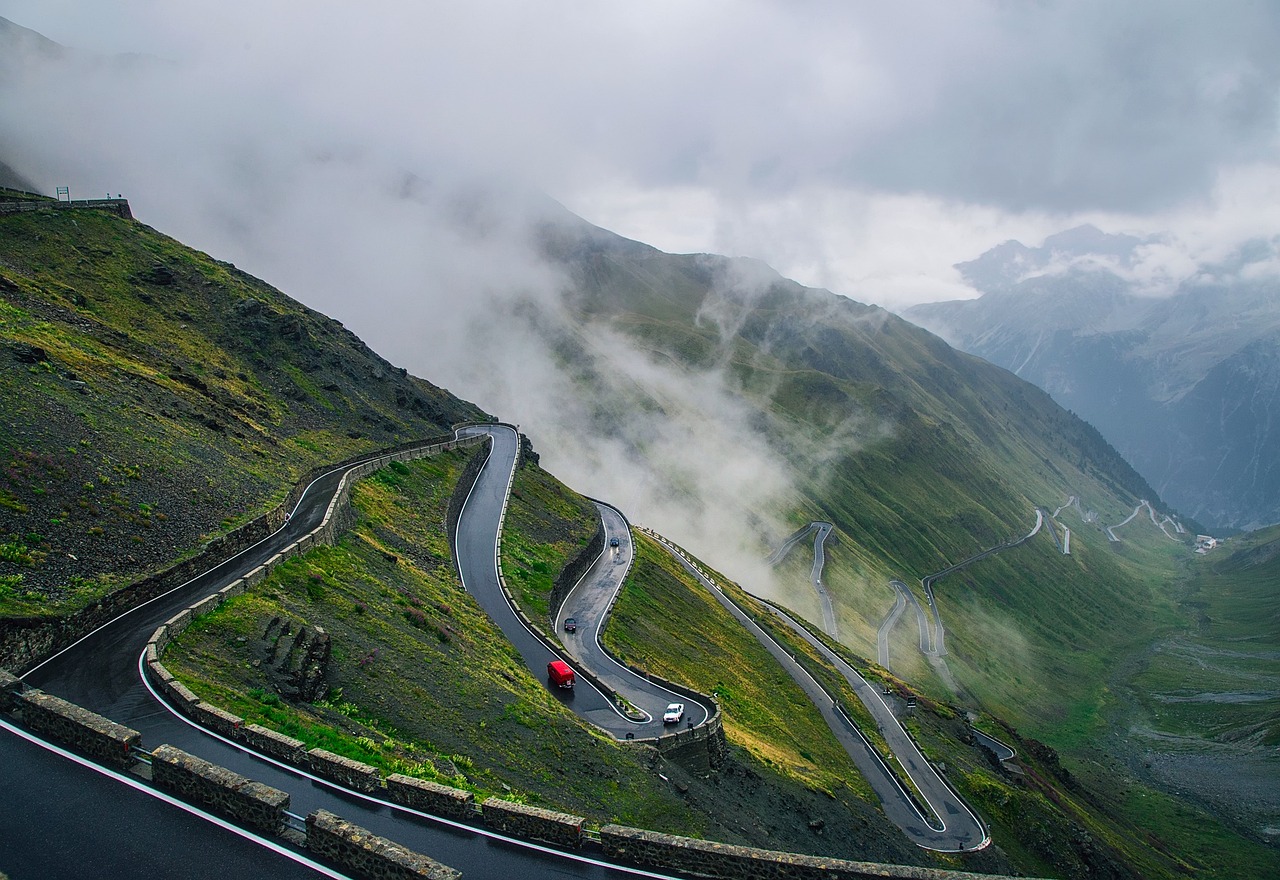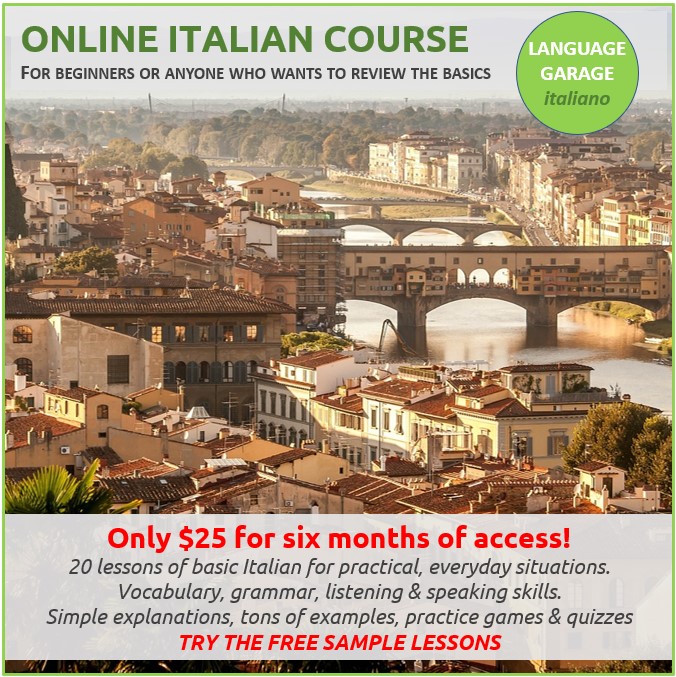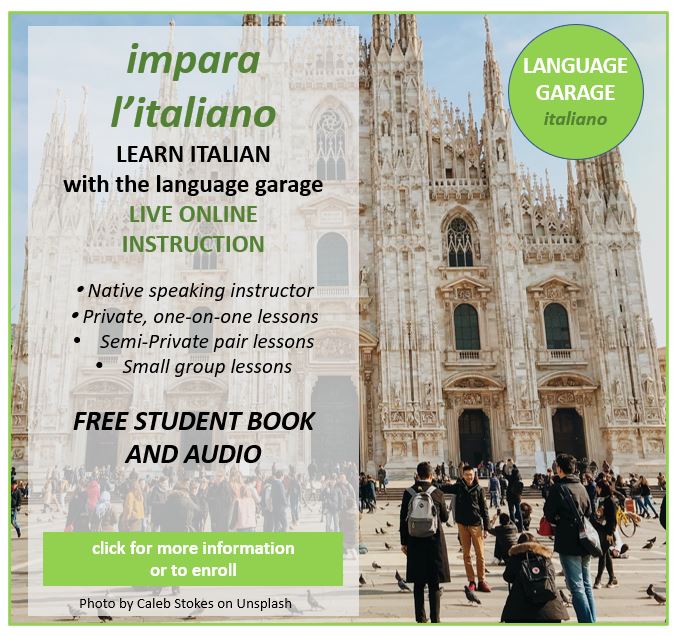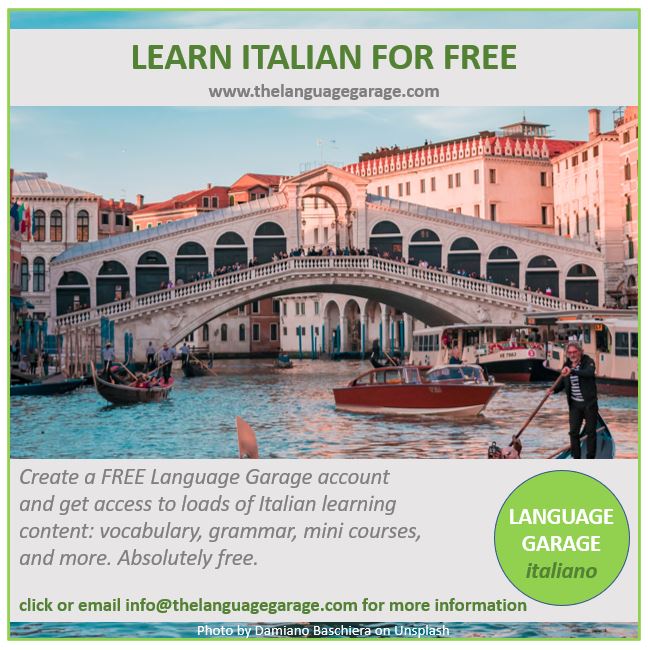Image by David Mark from Pixabay
In this post we’ll look at some Italian vocabulary related to cars and driving.
La mia auto My car
Let’s start with some basic vocabulary: una macchina (un’auto) (car), guidare (to drive), la benzina (gas/petrol), fare benzina (to get gas), riempire il serbatoio della benzina / fare il pieno (to fill the gas tank), la cintura di sicurezza (seatbelt), garage/box auto (garage), avviare la macchina / accendere la macchina (to start the car), parcheggiare l’auto (to park the car), l’area parcheggio (parking lot), il parcheggio (parking space), spegnere il motore (to turn off the engine).
- Hai una macchina?
Do you have a car? - Ho comprato una nuova auto.
I bought a new car. - Guido molto ogni settimana.
I drive a lot every week. - Allaccia la cintura di sicurezza.
Put on your seatbelt. - Devo fare benzina.
I need to get gas. - Il pieno, per favore.
Fill the tank, please. - Parcheggi in garage o in strada?
Do you park in a garage or on the street? - Non riesco a trovare un parcheggio.
I can’t find a parking space.
Sblocca la portiere della macchina! Unlock the car door!
Now let’s look at some vocabulary for parts of a car. la portiere (lo sportello) della macchina (car door), Il parabrezza (windshield), Il tergicristalli del parabrezza (windshield wipers), alzare/abbassare il finestrino (to put up/down the window), il cofano posteriore (bagagliaio) (trunk/boot), il cofano anteriore (hood/bonnet), il volante (lo sterzo) (steering wheel), il sedile anteriore (front seat), il sedile posteriore (back seat), i fari (headlights), i freni (brakes), il motore (engine), il lampeggiante (la freccia) (blinker, turn signal), le luci dei freni (le spie dei freni) (brake lights), cambiare l’olio (to change the oil), il meccanico/la meccanica (mechanic).
- Le valigie sono nel bagagliaio.
The suitcases are in the trunk. - I bambini sono seduti sul sedile posteriore.
The kids are sitting in the back seat. - C’è freddo! Solleva il finestrino e accendi il riscaldamento.
It’s cold! Put up the windows and turn on the heat. - C’è caldo! Apri il finestrino o accendi l’aria condizionata.
It’s hot! Open the windows or put the air conditioning on. - Sta piovendo. Devo azionare i tergicristalli.
It’s raining. I need to put on the windshield wipers. - È buio. Devo accendere i fari.
It’s dark. I need to put on the headlights. - Il motore è sotto il cofano.
The engine is under the hood. - La mia auto ha bisogno di nuovi freni.
My car needs new brakes. - Metti la freccia (il lampeggiante) e gira alla prossima strada.
Put on your blinker (turn signal) and turn at the next street. - Devo cambiare l’olio della macchina.
I need to change the oil in my car. - C’è qualcosa che non va nella mia macchina. Ho bisogno di un meccanico / una meccanica.
Something is wrong with my car. I need a mechanic.
Girare a destra al semaforo. Turn right at the traffic light.
Now let’s see some vocabulary that describes what we do when we drive. andare (guidare) dritto (to drive straight), girare a sinistra/destra (to turn left/right), invertire direzione (to reverse), cambiare marcia (to change gears), il semaforo (traffic light), il segnale di stop (stop sign), il limite di velocità (speed limit), suonare il clacson (to honk the horn),
- Stai guidando troppo veloce. Rallenta!
You’re driving too fast. Slow down! - Stai guidando troppo lentamente. Accelera!
You’re driving too slowly. Speed up! - Qual è il limite di velocità?
What is the speed limit? - Girare a sinistra al semaforo successivo.
Turn left at the next traffic light. - C’è un segnale di stop! Fermati!
There’s a stop sign! Stop! - Perché sta suonando il clacson?
Why is he honking his horn? - È uscita dal parcheggio in retromarcia e se n’è andata.
She reversed out of the parking spot and drove away.
Sulla strada On the road
Now let’s look at some things you’re likely to see when you’re on the road. la strada (street), l’autostrada (highway), l’uscita autostradale (highway exit), entrare in autostrada (to get on the highway), il casello autostradale (toll booth), il ponte (bridge), il segnale stradale (road sign), la rotatoria/rotonda (traffic circle/roundabout), il camion (truck), sorpassare una macchina (to pass a car), la corsia (lane), la stazione di servizio (il distributore) (gas station), l’ingorgo stradale (traffic jam), impiegare un’ora/due ore per guidare fino a X (to take one hour/two hours to drive to X.)
- Come arrivo in autostrada?
How do I get to the highway? - Esci dall’autostrada alla prossima uscita.
Get off the highway at the next exit. - C’è un casello dopo il ponte.
There’s a toll booth after the bridge. - Cosa c’è scritto su quel cartello?
What does it say on that sign? - Dove si trova il distributore di benzina più vicino?
Where is the nearest gas station? - Questa macchina va molto lentamente. Sorpassiamola.
This car is driving very slowly. Let’s pass it. - Non cambiare ancora corsia, c’è un camion dietro di te.
Don’t change lanes yet, there’s a truck behind you. - Il traffico è davvero pessimo a quest’ora del giorno.
Traffic is really bad this time of day. - Siamo bloccati/e in un ingorgo.
We’re stuck in a traffic jam. - Quanto tempo ci vuole per arrivare in aeroporto?
How long does it take to drive to the airport?
Ho una ruota a terra. I have a flat tire.
Sometimes things don’t always go perfectly well when we drive. sbagliare direzione (strada) (to make a wrong turn), perdersi (to be lost), una gomma a terra (a flat tire), essere senza benzina (to be out of gas), avere un incidente (to have an accident), frenare (schiacciare/premere il freno) (to slam on the brakes), sterzare (to swerve), slittare (to slide), sbandare (to skid), la batteria scarica (a dead battery), sbatere su un albero/andare addosso su un’altra macchina (to hit a tree/another car), prendere una multa (to get a ticket).
- Ho sbagliato strada. Ci siamo persi/perse.
I made a wrong turn. We’re lost. - Abbiamo una gomma a terra.
We have a flat tire. - Abbiamo avuto un piccolo incidente.
We had a minor accident. - L’autista davanti a me ha frenato di colpo.
The driver ahead of me slammed on his/her brakes. - Un cane ha attraversato (invaso) la strada e io ho sterzato per evitarlo.
A dog ran into the road, and I swerved to avoid it. - Le strade sono ghiacciate, quindi l’auto sta slittando.
The roads are icy, so the car is sliding. - Abbiamo inchiodato allo stop.
We skidded to a stop. - L’auto non parte. La batteria è scarica.
The car won’t start. The battery is dead. - Ho colpito un albero/un’altra macchina.
I hit a tree/another car. - Ero veloce e ho preso una multa.
I was speeding and got a ticket.
Taxi! Taxi!
Here are some vocabulary items and expressions that you can use for public transportation. il taxi (taxi), l’autobus (bus), la tariffa (fare), il posteggio dei taxi (taxi stand), la fermata dell’autobus (bus stop), salire sull’autobus (to get on the bus), scendere dall’autobus (to get off the bus).
- Dove posso prendere un taxi?
Where can I get a taxi? - Vorrei andare alla stazione dei treni, per favore.
I would like to go to the train station, please. - Per favore portami a questo indirizzo.
Please take me to this address. - Quant’è la tariffa?
How much is the fare? - Per favore, fermati qui.
Please stop here. - C’è un autobus dall’aeroporto al centro della città?
Is there a bus from the airport to the city center? - Scendiamo alla prossima fermata.
We get off at the next stop.
Dove posso noleggiare una macchina? Where can I rent a car?
Let’s close with some vocabulary and expressions that you can use when renting a car. noleggiare un’auto (to rent a car), due porte, quattro porte (two-door, four-door), quattro ruote motrici (four-wheel drive), la trasmissione automatica / il cambio automatico (automatic transmission), la trasmissione manual / il cambio manuale (manual transmission), l’assicurazione (insurance), la patente di guida (driver’s license), ritirare l’auto (to pick up the car), restituire/rendere l’auto (to return the car), limite di miglia/chilometraggio (mileage/kilometrage limit).
- Vorremmo noleggiare un’auto.
We would like to rent a car. - Vorremmo un’auto a due/quattro porte, per favore.
We would like a two-door/four-door car please. - Abbiamo bisogno di un veicolo a quattro ruote motrici.
We need a four-wheel drive vehicle. - Preferisci il cambio automatico o manuale?
Do you prefer automatic or manual transmission? - Ecco la mia patente di guida.
Here is my driver’s license. - Quanta assicurazione è inclusa?
How much insurance is included? - Qual è il limite giornaliero di miglia/chilometraggio?
What is the daily mileage/kilometrage limit? - Posso ritirare/restituire l’auto in aeroporto?
Can I pick up/return the car at the airport?
Do you want to learn Italian?
Check out our other posts on Italian language, culture, and more. And if you’re looking for convenient and affordable live Italian lessons with a real teacher, check out The Language Garage. Our lessons are given online in a virtual classroom, so it doesn’t matter where you live or work – we can come to you. And we have flexible options, with a free trial so that you can decide if there’s a fit. Check us out!






